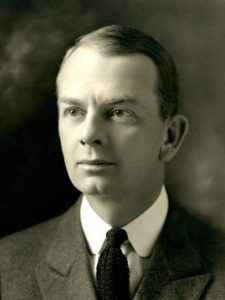
Photo info ...
Credit: Oversize Photograph Collection, Rare Books and Manuscripts, Indiana State LibraryView Source
(Jan. 7, 1884-Apr. 28, 1961). The son of a Methodist minister, much of Charles Jewett’s youth was spent in frequent moves throughout rural southern Indiana until the family settled in Indianapolis in 1902. Jewett’s education included attendance at various public schools, , DePauw University (A.B., 1907), and Harvard Law School (LL.B., 1910).
In 1910, he returned to Indianapolis, opened a law practice with a boyhood friend, and failed to win the nomination for the state legislature. In 1913, he was one of the founders of the Republican Union in Marion County, its purpose being to heal the breach between the party’s conservative and progressive wings.
He was elected Republican county chairman in 1914 and 1916. The electoral success of local GOP in those years won Jewett the party nomination for mayor in 1917 over former mayor . In the election, the maverick Shank, running on a “Home Rule” ticket, drew votes from the Democratic candidate, while Jewett campaigned vigorously against the “Shank Menace” and won with 42 percent of the vote.
Jewett’s accomplishments were substantial, given the city’s financial problems, which included lost liquor license revenues from the onset of Prohibition. He constructed comprehensive budgets matched to appropriations and centralized city purchasing. He instituted the platoon system for police and firemen, created a women’s branch in the police department, and motorized the fire department and increased firemans’ wages. Jewett also created a systematic plan for the collection and disposal of garbage and refuse and initiated the construction of the first sanitary and garbage disposal plants.
Tireless in giving speeches to put Indianapolis “over the top” in war bond drives, Jewett helped persuade the to establish its national headquarters in the city and was instrumental in getting the project underway.
After his term as mayor, Jewett returned to the law. He had been a delegate to the Republican national convention in 1920 and continued his interest in politics after 1922. He failed to win the nomination for governor in a crowded field of ten in 1928, ran unsuccessfully for Congress in 1938, and was active in support of campaign for mayor in 1942. He made his living from the law; as vice president of Jewett and Company, a bond house; owned a cattle farm; and was a director of the Fletcher bank. A 32nd degree Mason, Jewett belonged to the leading fraternal, business, social, and literary clubs in the city.

Help improve this entry
Contribute information, offer corrections, suggest images.
You can also recommend new entries related to this topic.